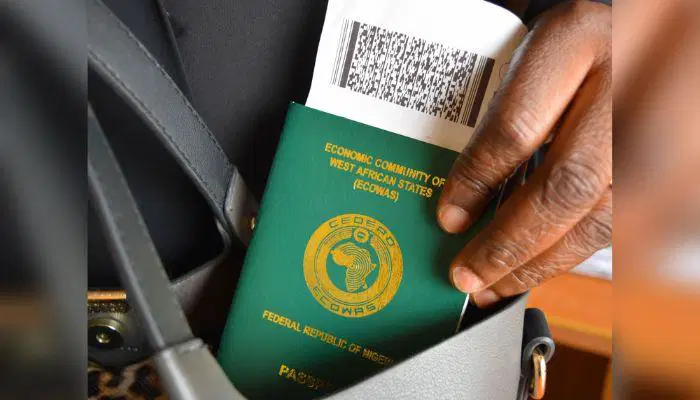Headline
10 Countries Hiring Nigerians, Other Foreign Workers In 2025 With Easy Visa Process

In 2025, the global race for skilled talent is intensifying as many countries grapple with labour shortages across key industries, prompting changes to visa policies to attract and retain foreign professionals.
In response, countries such as Canada, Japan, Australia, and Germany are expanding their immigration and visa pathways to attract foreign professionals.
According to TravelBiz, sectors like technology, healthcare, construction, and caregiving are seeing especially high demand in top destinations.
These countries aren’t just offering jobs—they’re also providing opportunities for long-term residency or even a pathway to citizenship.
Top 10 Countries Hiring Foreign Workers in 2025
1. New Zealand
New Zealand is streamlining immigration to address urgent gaps in its workforce.
In-demand roles: Civil Engineers, Registered Nurses, Plumbers, IT Professionals
Visa Pathway: Green List Straight to Residence Visa – direct pathway to permanent residency for critical occupations.
READ ALSO: Top 10 Most-visited Countries In The World
2. Spain
Spain has simplified work visa procedures to combat labour shortages.
Top roles: Construction Workers, Agricultural Labourers, Hospitality Staff
Visa Programs: Seasonal Worker Visa, General Long-Term Work Visa
3. Singapore
Asia’s innovation hub is actively hiring digital and biomedical professionals.
High-demand jobs: Biomedical Scientists, Software Developers, AI & Machine Learning Experts
Visa Options: Employment Pass (for professionals), S Pass (for mid-skilled workers)
Applicants should check the Ministry of Manpower (MOM) website for guidelines.
4. Romania
Romania is scaling up its workforce by issuing thousands of visas to foreign workers.
Key sectors: Construction, Agriculture, Hospitality
Visa Update: 100,000 annual guest worker visas approved for citizens of Nepal, Bangladesh, and India.
No university degree? No problem—these roles often don’t require one.
READ ALSO: 2025: Top 10 African Countries With The Largest Oil Reserves
5. Estonia
Estonia is emerging as a digital economy leader with simplified work visa options.
Hiring in: Software Development, Web Design, IT Support
Visa Options: D-Visa (short-term employment), Digital Nomad Visa (for remote workers)
6. Ireland
With a booming economy, Ireland is opening its doors to international professionals.
Jobs in demand: Nurses, Chefs, Childcare Workers, Data Scientists
Visa Programs: Critical Skills Employment Permit, General Employment Permit
7. Japan
Japan is overhauling its immigration system to welcome more foreign talent.
Hiring for: Caregivers, Factory Operators, IT Engineers, English Instructors
Visa Options: Specified Skilled Worker (SSW), Highly Skilled Professional (HSP) Visa
READ ALSO:Top 10 Most Productive Countries In Africa In 2025
8. Germany
Germany is making migration easier with a points-based system and international partnerships.
Top roles: Mechatronics Engineers, Technicians, Healthcare Workers, IT Specialists
Visa Type: Opportunity Card – a new system designed to simplify skilled migration
Knowing basic German is a plus; apply via the official Make it in Germany portal.
9. Canada
Canada remains one of the most immigrant-friendly countries, actively recruiting in multiple sectors.
In-demand jobs: Nurses, Truck Drivers, Welders, Software Engineers
Visa Options: Temporary Foreign Worker Program (TFWP), International Mobility Program (IMP)
Workers can switch jobs immediately after filing a new permit—no need to wait for approval.
10. Australia
Australia tops the list, thanks to booming demand in infrastructure and tech.
Top jobs: Construction Managers, Electricians, Cybersecurity Analysts, Aged Care Workers
Visa Route: Skills in Demand Visa, launched in December 2024, targets essential trades and high-growth fields
Apply early due to processing delays. Visit Home Affairs Australia and ensure your job title aligns with the official ANZSCO codes.
Headline
Russia Deploys Navy To Guard Venezuelan Oil Tanker Chased By US In Atlantic

Russia has deployed naval assets to escort a sanctioned oil tanker across the Atlantic following reported moves by the United States to seize the vessel.
US forces were said to be preparing to board the ship, which has a history of transporting Venezuelan crude oil and was last believed to be sailing between Scotland and Iceland.
CBS News reported that Russia stepped in to protect the tanker, raising the prospect of a direct confrontation between the two powers at sea.
READ ALSO:Russia Calls up 135,000 Military Personnel
By sending naval ships into the North Atlantic, Russian President Vladimir Putin is signalling to United States President Donald Trump that any US action would carry consequences, coming after the US president threatened that he might use the military to seize Greenland.
The tanker, currently empty, previously operated under the name Bella 1. Last month, the US Coast Guard attempted to board it in the Caribbean with a warrant over alleged breaches of US sanctions and claims that it had shipped Iranian oil.
The vessel later changed course, renamed itself Marinera and reportedly reflagged from Guyana to Russia.
READ ALSO:Venezuela Frees Eight Opposition Leaders
Trump last month said he had ordered a ‘blockade’ of sanctioned oil tankers entering and leaving Venezuela, a policy the government in Caracas branded ‘theft’.
Ahead of the US seizure of ousted Venezuelan leader Nicolás Maduro on Saturday, Trump accused the country’s government of using ships to smuggle drugs into the United States.
Two US officials told CBS News on Tuesday that American forces were planning to board the Marinera, adding that Washington would prefer to seize the tanker rather than sink it.
Russia’s Foreign Ministry said it expects Western countries to respect principles of freedom of navigation.
(Daily Mail News)
Headline
UK Introduces Powers To Seize Phones, SIM Cards From Illegal Migrants

The United Kingdom has rolled out expanded enforcement powers allowing authorities to confiscate mobile phones and SIM cards from migrants who enter the country illegally.
The new measures, which do not require an arrest, came into force on Monday at the Manston migrant processing centre in Kent and represent a significant tightening of border controls.
According to the Home Office, the powers are intended to support intelligence-gathering operations aimed at disrupting criminal networks that organise and profit from dangerous Channel crossings.
Officials at the centre are equipped with technology that enables them to extract and analyse data from seized devices, a move the government says will help track and dismantle smuggling rings.
READ ALSO:Russia-Ukraine War: Pope Leo Calls For Global Christmas Truce
Under the revised rules, migrants are permitted to be asked to remove outer garments if there is suspicion that phones are being concealed.
In certain circumstances, officers may also check mouths for hidden SIM cards or small electronic items.
The National Crime Agency said information recovered from devices could accelerate investigations and improve the effectiveness of action against organised crime groups.
Border Security Minister Alex Norris said the policy was necessary to regain control of the UK’s borders and confront human trafficking operations.
“We are committed to restoring order and tackling the people-smuggling gangs behind this lethal trade,” Norris said.
READ ALSO:
“These stronger laws give authorities the tools to disrupt, intercept and dismantle these networks more quickly and effectively,” he added.
The legislation also introduces tougher criminal penalties linked to illegal crossings.
Individuals found storing or supplying boat engines for unauthorised journeys could face prison terms of up to 14 years, while those involved in researching equipment or plotting routes may be liable to sentences of up to five years.
Government officials stressed that the powers would be exercised with discretion.
READ ALSO:UK Unveils Record-breaking Bid For 2035 Women’s World Cup
The Minister for Migration and Citizenship, Mike Tapp, said devices could be returned depending on individual circumstances and the relevance of the information obtained.
“If a device may contain intelligence that helps combat smuggling, it is right that it can be seized,” Tapp said, adding that the approach would not undermine compassion toward migrants.
However, humanitarian organisations have expressed unease about the impact of the policy.
The Refugee Council warned that mobile phones often serve as vital lifelines for migrants, enabling contact with family members and access to support services, and urged authorities to ensure the measures are applied in a proportionate and humane manner.
Headline
PROPHECY: Primate Ayodele Reveals Trump’s Plot Against Tinubu

Primate Ayodele and Tinubu, Tinubu’s rice palliative, Primate Ayodele to Tinubu
Tinubu and Primate Ayodele
The leader of INRI Evangelical Spiritual Church, Primate Elijah Ayodele, has warned President Bola Ahmed Tinubu that US President Donald Trump is after removing him from office.
This comes amid the removal of Vanezuelan President Nicolás Maduro by Donald Trump.
Primate Ayodele, in a statement signed Sunday by his media aide, Osho Oluwatosin, made it known that the US President has ‘caged’ Tinubu and his plan is to ultimately see that he is removed from office.
READ ALSO:Primate Ayodele Releases Fresh Prophecies On FIRS, FAAN, Others
He stated that the support the US is giving Nigeria to fight insecurity isn’t for nothing other than ways to penetrate the government.
“Trump is adamant to remove President Tinubu. America will be part of those who will be against Tinubu. You may not see it as I am being shown, and that’s why I am saying Trump is after removing Tinubu, that’s it and nothing more.”
The cleric made it known that, despite US’ help, Nigeria will continue to fight insecurity, but the ulterior motive of the US President isn’t about ending insecurity in the country.
READ ALSO:Guber Polls: Primate Ayodele Releases Prophecies On Anambra, Ekiti, Osun
“Nigeria will still continue to fight insecurity, but either they fight it or not, Trump is focused on removing Tinubu from office, but he doesn’t know it yet. He isn’t after ending insecurity in the country, he knows what he wants and won’t stop at nothing towards achieving it.”
He urged the president to take a bold political step to overcome the plans of the US president; otherwise, he will end up succeeding with his plans.
“Tinubu must take a very bold step to overcome the plans of Trump, because he has caged him already. Tinubu must not relent his efforts and bring up strategies for him to succeed otherwise, he would be at the losing end while his defeat would be celebrated,” he added.

 News3 days ago
News3 days agoWhat I Saw After A Lady Undressed Herself — Pastor Adeboye

 Headline3 days ago
Headline3 days agoPROPHECY: Primate Ayodele Reveals Trump’s Plot Against Tinubu

 Metro3 days ago
Metro3 days agoArmed Robbers Shot PoS Operator To Death In Edo

 Politics3 days ago
Politics3 days ago2027: Rivers APC Pledges To Follow Wike’s Instructions

 Metro3 days ago
Metro3 days agoJoint Task Force Kills 23 Bandits Fleeing Kano After Attacks

 Metro3 days ago
Metro3 days agoGunmen Demand N200m Ransom For Kidnapped Brothers In Edo

 Metro2 days ago
Metro2 days agoAAU Disowns Students Over Protest

 Entertainment3 days ago
Entertainment3 days agoPHOTOS: Anthony Joshua Makes First Social Media Post After Surviving Deadly Car Crash

 Metro2 days ago
Metro2 days agoEdo: Suspected Kidnappers Kill Victim, Hold On To Elder Brother

 Metro2 days ago
Metro2 days agoNine Soldiers Feared Dead In Borno IED Explosion






























